Understanding Your HMRC Tax Code: What Do the Letters and Numbers Mean?
June 1, 2025Understanding Self-Assessment Penalties: What You Need to Know
June 9, 2025📄 What is a P11D Form? A Guide for Employers and Employees
If you’re an employer or employee in the UK, the term P11D might have come up around tax season. But what exactly is a P11D, and why does it matter?
🔍 What is a P11D?
The P11D is a form submitted to HMRC by employers to report benefits in kind (BiKs) given to employees or directors. These are benefits not included in the salary but still have value – like a company car, private health insurance, or interest-free loans.
💡 In short: The P11D tells HMRC about any extra perks an employee received that may be taxable.
🧾 Examples of Benefits That Go on a P11D:
- 🚗 Company car or fuel allowance
- 🏥 Private medical insurance
- 🏡 Living accommodation
- 💰 Loans over £10,000 with zero or low interest
🕒 When is the P11D Due?
- Submission Deadline to HMRC: 6 July following the end of the tax year
- Employee Copy Deadline: Must also be given to employees by 6 July
- Payment Deadline for Class 1A NIC: 22 July (or 19 July if by post)
📌 What’s the Employer’s Responsibility?
- Submit a P11D for each employee who received BiKs.
- Submit a P11D(b) to declare the Class 1A National Insurance due on those benefits.
- Keep accurate records of all employee benefits.
🧮 Do Employees Need to Do Anything?
Employees don’t submit the P11D. But they may see a change in their tax code or may need to pay extra tax if the benefits aren’t taxed through payroll.
✅ Can You Avoid Filing a P11D?
Yes, if all benefits are payrolled – that is, taxed through the payroll system. In that case, you don’t need to file a P11D for those employees, but you still need to file a P11D(b).
⚠️ Common Mistakes to Avoid
- Forgetting to submit on time (can lead to penalties)
- Not updating changes in benefits
- Failing to give the employee a copy
💼 Need Help with P11Ds?
Whether you’re an employer unsure about your obligations or an employee confused by your tax code, professional guidance can save you time, money, and penalties.



